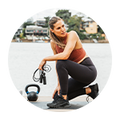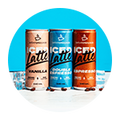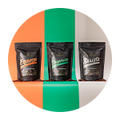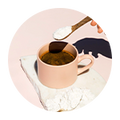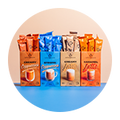Have you ever stopped to think, maybe coffee is addicted to me?!
I certainly have. But I can also agree that I may be a caffeine addict! I cannot go without a coffee first thing in the morning, many people are in the same boat and cannot imagine their day without having set aside some time for their favourite beverage.
And coffee is the most favoured drink of the civilised world...
I ALWAYS get asked in clinic – what’s the deal with coffee? Is is good or bad? Should I be having it black or can I have milk? Can I have sugar or should I avoid sugar? How much is too much? How many shots can I have? Will coffee make me lose weight? The list goes on… Interestingly, caffeine just like anything has it’s pros and cons. So sit back and relax with your favourite cup and I’ll hit you with my best shots ;)
Caffeine & Performance
It’s a no brainer that caffeine has positive effects on sports performance when utilised in a safe and effective manner. The main performance benefits associated with caffeine are the effects it plays on the central nervous system – giving you that buzz effect and the perception of having more energy and therefore a greater energy output when it comes to exercising. But how does this happen? Well, caffeine acts as an adenosine receptor antagonist… The stimulant effect of coffee comes largely from the way it acts on the adenosine receptors in the neural membrane.
Adenosine is a central nervous system neuromodulator that has specific receptors. When adenosine binds to its receptors, neural activity slows down, and you feel sleepy. Caffeine binds to these same receptors, but without reducing neural activity- giving you that noticeable effect of alertness. Also, caffeine activates many neural circuits and causes the pituitary gland to secrete hormones that in turn cause the adrenal glands to produce more adrenalin. Adrenalin is the “fight or flight” hormone, so it increases your attention level and gives your entire system an extra burst of energy. In simple terms, you are improving your ability to go harder for longer – before hitting that wall. This is exactly the effect that many athletes are looking for. Hence #acupofgetshitdone is needed first thing Monday morning.
The Ideal Dosage
So, what’s the deal? How much is necessary to get that kick and what is considered too much?
Earlier research previously suggested high doses of caffeine ( 6+mg/kg BW) was conducive to overall performance – for someone weighing 70 kg that’s 420mg! (to put things into perspective, a sachet of BYS has roughly 120mg, so you do the math!). Now the current research is showing that smaller doses ranging between 1-3 mg/kg/bw is just as effective for eliciting performance benefits with less undesirable side effects. And as always – especially for athletes, it’s best to trial these types of things as sometimes introducing new protocols during training or competition events can be detrimental to performance. It's best to always chat to an accredited Sports Dietitian to determine the most beneficial timing protocol, coupled with the lowest effective dose of caffeine to give you that KICK.
Coffee & Weight
It's not the caffeine will impact weight, its everything else you put with it!
I am an everything in moderation kind of gal. Having one of your favourite cuppas isn’t going to be the end of the world – whether it’s a flat white or a long black. My concern is when people steer too far from the definition of a true cup of coffee and start ordering calorie heavy drinks. You know the ones loaded with about 15 teaspoons of sugar and whipped cream, but are marketed as healthy because they're made on skim milk. For example, an extra large skinny mocha with an extra shot of hazelnut syrup and 2 sugars with added chocolate on top...
All of these additional add-ons to your coffee can blow your daily calorie requirement out of the water. Not only that, but you'll hit a wall reallll quick when you feel the sugar crash leading you to reach for more. So, sit back and ask yourself, is it the caffeine you are addicted to here? Or is it simply the sugars associated with it? Sugar can be very addictive and can impact your waistline at the same time. But that’s a story for another day…
Caffeine & Sleep
Some individuals can be more caffeine sensitive than others, when it comes to how much caffeine you can have until it affects you, is basically like saying how long is a piece of string? Remember everyone’s genetic makeup and biochemistry are different. If you know you have higher caffeine sensitivity levels you are more likely to experience the unnecessary side effects such as: sleep disturbance, nervousness, restlessness, and increased anxiety levels to name a few. Interestingly, the half-life of caffeine (an indication of its duration of action) is approximately 6-7hrs. In saying this, your best bet is figuring out what your ‘no caffeine time zone‘ is to help minimise the likelihood of these side effects occurring. For me this is around the 3:30pm mark, anything later than this and I’m counting sheep till 1 am in the morning…
Coffee & Food Intolerances
Individuals with food or chemical sensitivity issues, histamine intolerances, and IBS may experience more of these symptoms when consuming caffeine.
Studies have identified that there appears an association with coffee consumption and digestive health issues in those who have IBS and histamine intolerances. However, the scientific evidence is not quite clear cut – so always proceed with caution and chat to a medical professional for personalised advice.
More isn't better
Stick to the recommended guidelines to ensure you don’t have any negative side effects – remember everything in moderation.
You are a special little bean
Remember everyone is unique, and nutrition isn’t a one size fits all. Therefore, individual responses to caffeine vary significantly – always start with smaller dosages.
Add it up
Have an idea of how much you are consuming and the times in which you are drinking caffeine – it’s always a trial and error.
Practice
Always try before you buy, hahaha. No, but seriously when it comes to performance and sporting events – it’s always best to have a trial run of the protocols you are wanting to implement prior to the event to determine the best approach for you.
—

